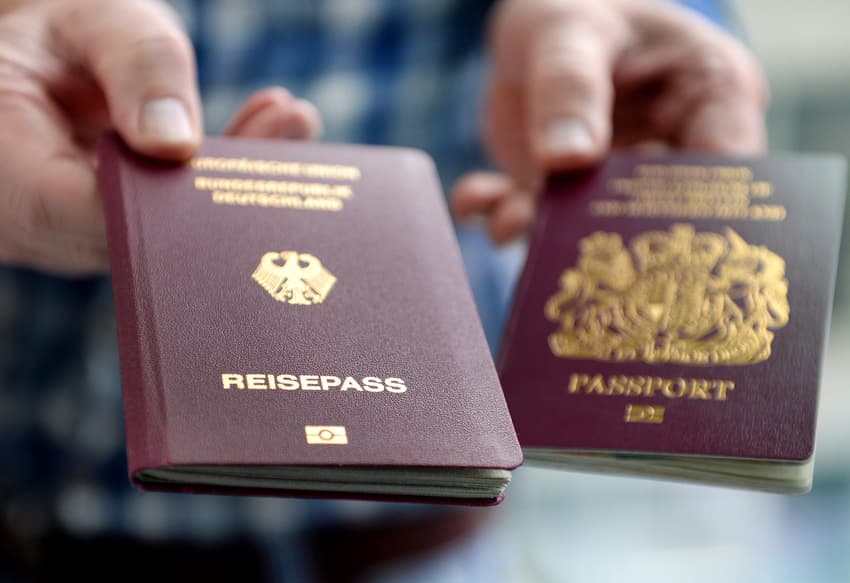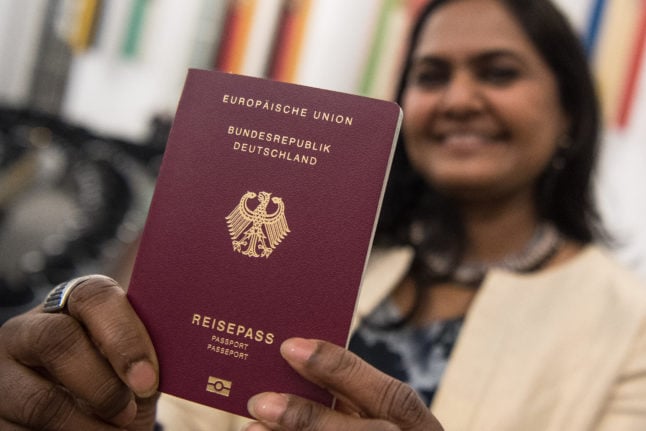'European again': How changes to citizenship rules will affect Brits in Germany

When the UK completed the final stage of Brexit at the end of 2020, many Brits in Germany were devastated at the loss of their EU rights. But promises made by Germany's new government to allow dual nationality have given them renewed hope.
When the UK narrowly voted to leave the EU in 2016, many British people living abroad didn't get a say in the change. The UK's laws previously put an arbitrary limit on voting rights for citizens abroad, meaning anyone who had spent more than 15 years in a foreign country was no longer able to vote in elections back home.
For others who did have a voice, the result of the referendum was equally devastating: many were fearful about their future residence rights in the EU and the ability to continue living the lives they had built. Though the negotiations ended up dragging on, when Brexit finally arrived, the sense of loss was palpable.
In March 2020, when the first part of the exit from the EU was completed, British nationals were stripped of the right to vote in EU and local elections. They were no longer able to apply for EU-only jobs. Then, the final exit from the European Economic Area (EEA) and Customs Union on January 1st, 2021 brought with it the end of their freedom of movement within the EU.
But the German government's pledge to overhaul nationality laws, including dual citizenship, gives hope to Brits.
In a survey by The Local on the plans earlier this year, several Brits told us they were thrilled to hear of the rule changes and would "definitely" apply for citizenship in the future. The traffic-light coalitions' plans to ditch an age-old ban on the holding of multiple nationalities has given Brits hope that they can someday regain these rights by applying to become German, while not relinquishing their British passport or identity.
READ ALSO: Germany’s new coalition government to allow dual nationality
"This will allow me to regain the security of place and home that I had in Germany as an EU citizen prior to Brexit," said Jay, 44, who lives in Berlin.
Frankfurt resident Rachel, 49, described the government's plans to allow dual nationality as "fantastic".
"The very thought of being able to hold dual nationality already makes me feel more German whilst still holding onto my British nationality," she said. "It also means that I'll be able to vote in general elections in the future and can regain my freedom of movement."
Many of the Brits who gave us their thoughts mentioned the same motivation for becoming German: reclaiming the right to live and work in any country within the EU.
While UK citizens who had lived in Germany before Brexit had their right of residence in the country assured by the Withdrawal Agreement, those without German citizenship are essentially "landlocked", meaning they no longer have automatic residency rights in any other EU country.
"I’ll be able to become European again after Brexit," 42-year-old Mark Smith in Berlin said of the planned changes to citizenship rules. "I get a chance to regain freedom of movement within the EU."
A two-class system
When Britain left the EEA and Brits lost their freedom of movement rights, another important change took place overnight in Germany.
Brits who hadn't been able to apply for German citizenship before this date were (under the current rules) no longer entitled to dual nationality.
Currently, only citizens of EU countries are allowed to keep their previous nationality when becoming a naturalised German. Everyone else, generally, has to choose between their existing passport and a German one, unless they have compelling financial or personal reasons not to.
The rules have so far created a two-class system of Brits in Germany: the some 40,000 who were able to get dual nationality before the cut-off date, and the some 40,000 who weren't.
READ ALSO: Brexit: How thousands of Brits in Germany will be in limbo after doors close on dual nationality

An anti-Brexit campaigner holds a placard saying "Brexit was not worth it" outside the UK parliament in London. Photo: picture alliance/dpa/PA Wire | Dominic Lipinksi
For 38-year-old Jack in Berlin, this division runs right through the heart of the family. Jack moved to Germany back in 2017 "hoping Brexit would never happen". While he had only been in the country for around three years when the UK left the EEA, his husband has lived here for much longer and was able to get citizenship before the cut-off date.
"My husband, who had accumulated enough years in Germany in the past was able to get his German citizenship prior to the Brexit cut-off date, but I was not able to," he told The Local. "While being technically married to a German citizen, thus rules for becoming a German citizen being easier compared to others, I was still not sure whether I would want to give up my British citizenship."
Jack says he hopes the changes will come into force quickly so he doesn't have to live with a passport that doesn't say European Union on it.
"My current British passport still says European Union on it, but it is going to expire in a few years," he said.
READ ALSO: When will Germany relax its dual citizenship laws?
'Solemn decision'
While many people jumped at the chance to get their application for citizenship in ahead of Brexit, others were reluctant to make such a major decision on a tight deadline.
This was the case for Simon, a 51-year-old resident of Cologne. Despite having spent 18 years in Germany - and planning to spend the rest of his life here - he struggled with the idea of taking on a new nationality simply because of political decisions made back in the UK.
"I have tremendous respect for Germany," he told The Local. "It is a wonderful place to live, sophisticated and stimulating culture, excellent quality of life, lovely people. But to take on German citizenship also means taking on the burden of history as well."

The German flag hangs in a Frankfurt church during a naturalisation ceremony for new Germans. Photo: picture alliance / Fabian Sommer/dpa | Fabian Sommer
Having decided to simply take permanent residency instead of citizenship, he has since come to the conclusion that that he would be happy to become German - in part because of the work Germany has done over the years in coming to terms with its dark history.
"Nevertheless, this is a truly solemn decision," he said.
For Simon, the planned changes to the dual nationality rules have taken the time pressure off to allow him to mull over the personal and ethical ramifications of becoming German.
"I will definitely take up German citizenship at some point," he said. "But I will do it on my own terms and my own timeline, not with a gun to my head and on a schedule dictated for by by far the worst, shambolic, low-grade, nasty and insular British regime of modern history."
'Committed to Germany'
In the aftermath of the Brexit vote, citizens' rights group British in Europe and its Germany-based wing British in Germany were established to give Brits in the EU a voice.
Though its primary work was trying to ensure that key rights for citizens were set out in the Withdrawal Agreement, the group also took a strong stance on Germany's previously strict rules against dual nationality, campaigning for the ban to be lifted ahead of federal elections last September.
"British in Germany wrote to most of the key political parties in Germany before the autumn election and were very encouraged by some of the responses, including from the coalition partners," British in Germany chair Jane Golding told The Local. "We very much welcome the plans on dual nationality."
Brexit has always been a highly emotive issue on both sides of the debate, partly because it speaks to people's sense of identity.
Several respondents to our survey told us how much they had valued the European citizenship they had before, and how desperate they were to regain it.
"I'm so relieved that they are changing the rules," said 42-year-old Hannover resident Larisa Sharifi. "I hated feeling like my EU citizenship was lost."

A newly naturalised German citizen holds up her new passport. Photo: picture alliance / Fabian Sommer/dpa | Fabian Sommer
According to British in Germany, the appetite for becoming German is huge among many of the Brits who didn't make the original cut-off at the end of 2020.
When the new law permitting multiple nationalities comes into force - which could be as early as this year - thousands of Brits will be clamouring to become a citizen of the EU once again.
READ ALSO: ‘I can’t give up my passport’: Foreigners wait for Germany to change citizenship laws
"We know that many more UK citizens who have residency rights under the Withdrawal Agreement provisions would like to take dual nationality once the laws change," said Golding.
"Like other third country nationals who have been in Germany for a long time, most feel very integrated, and committed to Germany, and becoming German would allow them to participate even more fully in German society, including voting and standing for election.
"At the same time. keeping their original citizenship is an insurance policy in case, for example, they have to go back to their country of origin to look after elderly relatives in future.”
Comments
See Also
When the UK narrowly voted to leave the EU in 2016, many British people living abroad didn't get a say in the change. The UK's laws previously put an arbitrary limit on voting rights for citizens abroad, meaning anyone who had spent more than 15 years in a foreign country was no longer able to vote in elections back home.
For others who did have a voice, the result of the referendum was equally devastating: many were fearful about their future residence rights in the EU and the ability to continue living the lives they had built. Though the negotiations ended up dragging on, when Brexit finally arrived, the sense of loss was palpable.
In March 2020, when the first part of the exit from the EU was completed, British nationals were stripped of the right to vote in EU and local elections. They were no longer able to apply for EU-only jobs. Then, the final exit from the European Economic Area (EEA) and Customs Union on January 1st, 2021 brought with it the end of their freedom of movement within the EU.
But the German government's pledge to overhaul nationality laws, including dual citizenship, gives hope to Brits.
In a survey by The Local on the plans earlier this year, several Brits told us they were thrilled to hear of the rule changes and would "definitely" apply for citizenship in the future. The traffic-light coalitions' plans to ditch an age-old ban on the holding of multiple nationalities has given Brits hope that they can someday regain these rights by applying to become German, while not relinquishing their British passport or identity.
READ ALSO: Germany’s new coalition government to allow dual nationality
"This will allow me to regain the security of place and home that I had in Germany as an EU citizen prior to Brexit," said Jay, 44, who lives in Berlin.
Frankfurt resident Rachel, 49, described the government's plans to allow dual nationality as "fantastic".
"The very thought of being able to hold dual nationality already makes me feel more German whilst still holding onto my British nationality," she said. "It also means that I'll be able to vote in general elections in the future and can regain my freedom of movement."
Many of the Brits who gave us their thoughts mentioned the same motivation for becoming German: reclaiming the right to live and work in any country within the EU.
While UK citizens who had lived in Germany before Brexit had their right of residence in the country assured by the Withdrawal Agreement, those without German citizenship are essentially "landlocked", meaning they no longer have automatic residency rights in any other EU country.
"I’ll be able to become European again after Brexit," 42-year-old Mark Smith in Berlin said of the planned changes to citizenship rules. "I get a chance to regain freedom of movement within the EU."
A two-class system
When Britain left the EEA and Brits lost their freedom of movement rights, another important change took place overnight in Germany.
Brits who hadn't been able to apply for German citizenship before this date were (under the current rules) no longer entitled to dual nationality.
Currently, only citizens of EU countries are allowed to keep their previous nationality when becoming a naturalised German. Everyone else, generally, has to choose between their existing passport and a German one, unless they have compelling financial or personal reasons not to.
The rules have so far created a two-class system of Brits in Germany: the some 40,000 who were able to get dual nationality before the cut-off date, and the some 40,000 who weren't.
READ ALSO: Brexit: How thousands of Brits in Germany will be in limbo after doors close on dual nationality

For 38-year-old Jack in Berlin, this division runs right through the heart of the family. Jack moved to Germany back in 2017 "hoping Brexit would never happen". While he had only been in the country for around three years when the UK left the EEA, his husband has lived here for much longer and was able to get citizenship before the cut-off date.
"My husband, who had accumulated enough years in Germany in the past was able to get his German citizenship prior to the Brexit cut-off date, but I was not able to," he told The Local. "While being technically married to a German citizen, thus rules for becoming a German citizen being easier compared to others, I was still not sure whether I would want to give up my British citizenship."
Jack says he hopes the changes will come into force quickly so he doesn't have to live with a passport that doesn't say European Union on it.
"My current British passport still says European Union on it, but it is going to expire in a few years," he said.
READ ALSO: When will Germany relax its dual citizenship laws?
'Solemn decision'
While many people jumped at the chance to get their application for citizenship in ahead of Brexit, others were reluctant to make such a major decision on a tight deadline.
This was the case for Simon, a 51-year-old resident of Cologne. Despite having spent 18 years in Germany - and planning to spend the rest of his life here - he struggled with the idea of taking on a new nationality simply because of political decisions made back in the UK.
"I have tremendous respect for Germany," he told The Local. "It is a wonderful place to live, sophisticated and stimulating culture, excellent quality of life, lovely people. But to take on German citizenship also means taking on the burden of history as well."

Having decided to simply take permanent residency instead of citizenship, he has since come to the conclusion that that he would be happy to become German - in part because of the work Germany has done over the years in coming to terms with its dark history.
"Nevertheless, this is a truly solemn decision," he said.
For Simon, the planned changes to the dual nationality rules have taken the time pressure off to allow him to mull over the personal and ethical ramifications of becoming German.
"I will definitely take up German citizenship at some point," he said. "But I will do it on my own terms and my own timeline, not with a gun to my head and on a schedule dictated for by by far the worst, shambolic, low-grade, nasty and insular British regime of modern history."
'Committed to Germany'
In the aftermath of the Brexit vote, citizens' rights group British in Europe and its Germany-based wing British in Germany were established to give Brits in the EU a voice.
Though its primary work was trying to ensure that key rights for citizens were set out in the Withdrawal Agreement, the group also took a strong stance on Germany's previously strict rules against dual nationality, campaigning for the ban to be lifted ahead of federal elections last September.
"British in Germany wrote to most of the key political parties in Germany before the autumn election and were very encouraged by some of the responses, including from the coalition partners," British in Germany chair Jane Golding told The Local. "We very much welcome the plans on dual nationality."
Brexit has always been a highly emotive issue on both sides of the debate, partly because it speaks to people's sense of identity.
Several respondents to our survey told us how much they had valued the European citizenship they had before, and how desperate they were to regain it.
"I'm so relieved that they are changing the rules," said 42-year-old Hannover resident Larisa Sharifi. "I hated feeling like my EU citizenship was lost."

According to British in Germany, the appetite for becoming German is huge among many of the Brits who didn't make the original cut-off at the end of 2020.
When the new law permitting multiple nationalities comes into force - which could be as early as this year - thousands of Brits will be clamouring to become a citizen of the EU once again.
READ ALSO: ‘I can’t give up my passport’: Foreigners wait for Germany to change citizenship laws
"We know that many more UK citizens who have residency rights under the Withdrawal Agreement provisions would like to take dual nationality once the laws change," said Golding.
"Like other third country nationals who have been in Germany for a long time, most feel very integrated, and committed to Germany, and becoming German would allow them to participate even more fully in German society, including voting and standing for election.
"At the same time. keeping their original citizenship is an insurance policy in case, for example, they have to go back to their country of origin to look after elderly relatives in future.”
Join the conversation in our comments section below. Share your own views and experience and if you have a question or suggestion for our journalists then email us at [email protected].
Please keep comments civil, constructive and on topic – and make sure to read our terms of use before getting involved.
Please log in here to leave a comment.